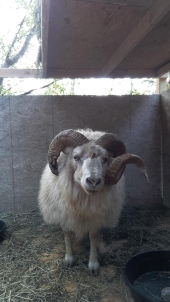r ranson:
thanks for all the info! I have bred registered Nubians for quite some time on a very small scale so I'm pretty up and up about caring for ruminants. My 3 girls get a mix of yeast, dairy mineral, sea salt and kelp. I also like to blend up a natural dewormer as a treat for them as well as using the commercial dewormers when needed. I've had serious problems with parasites this year, the location my goats have been at for the past few years is not my ideal pasture, its big enough for them to graze but no forage and they end up picking up their own parasites off the grass. I am a true believer in dry lot management unless one has access to lots of land! I am going to be keeping these sheep at my actual property instead of where I have been leasing the past few years, much dryer ground and never had livestock on it before (alpine, at 800ft elevation). I wouldn't get the sheep until 2021 so I'm planning way ahead.
r ranson wrote:
An important thing to remember is that there are breeds and there are individual flocks.
agreed, it took years for me to figure out which Nubian herds I liked best in western Canada and there are HUGE differences within the breed. This can be a very difficult thing to figure out though when starting a new species/breed because everyone has different opinions and people tend to say their animals meet every criteria even if its a lie!
r ranson wrote: I noticed in our area, many of the reproductive traits (like twinning or easy birth) common to the breeds weren't as strong as I expected.
this is good to know as well.
As for your questions, I hand spin, so I have no plans to sell the fleeces. I want to comb it, though I currently don't have combs, its only the list for things I need. I can't believe how expensive they are!
r ranson wrote:if so, what will you feel like when you discover your lovely lamb you sold soandso is living in a wallow up to its chest in mud and being wormed once a week with toxic dog meds?
my main motivation for getting out of dairy goats is the stress of dealing with a crap buying mark on the island and the enraging aspect of finding out later that a home I thought was good is actually a terrible animal steward. Second stressor is the fact that dairy goats really need to be disbudded to have any selling value (plus Nubian horns are somewhat dangerous). I don't agree with people disbudding on the farm without full anesthetic so that means I have to go to Mill Bay vet every time I have female kids born and they now charge over $100 per kid. Ridiculous. Also, to get milk they have to be bred obviously, which is another bummer because I don't really want goat kids to deal with, thus why I'm switching to fibre. I would go with Angora goats except that I really don't think they suite this climate, they don't seem hardy enough for the rain we get.
What do I mean by richer hay demands? I mean that on the island we don't grow hay that is truly suitable for heavily producing dairy goats so I have to buy the stuff brought over from Keremeos or Creston at $20-25 a bale. I am hoping based on my reading that sheep would thrive off of local hay (but thank you about the nitrogen comment because I was wondering if cow dairy farm grown hay would be toxic from the nitrogen levels in it). Do you feed a local hay?
I'm considering keeping one of my goats because she is my absolute baby and I am having a very difficult time deciding to find her a new home. I'm not a sure a sheep and a goat would be happy together though... I don't plan to breed the sheep, at least not for the time being. If I've learned anything over the years it is that breeding and selling livestock is NOT worth the stress and dealing with the buyers (or lack of). I think its a fine idea but there tends to always be too many people selling and not enough people buying. My experience of the island especially has been that most buyers here are city folks who want to play at farming but have no real sense of how much things cost so they think they should be able to buy a kid or lamb for $100 bucks. This is a huge reg flag because if you live on this rock you know that hay and vet costs will far outweigh that $100 in a year alone. When a buyers first question to me is "how much" I usually don't take that sale any further.
cotswold are certainly interesting, I wish they were smaller though! How many bales do you go through per sheep per month? How much do those bales weigh?

 1
1








 1
1




 7
7















 3
3















 3
3




 1
1




 2
2




 3
3








